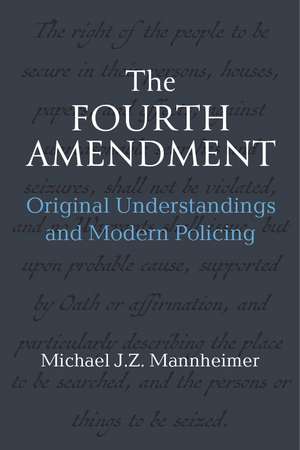The Fourth Amendment: Original Understandings and Modern Policing
Autor Michael J. Z. Mannheimeren Limba Engleză Paperback – 22 aug 2023
This book contends that the courts’ misinterpretation of these provisions has led them to hold federal and state law enforcement mistakenly to the same constitutional standards. The Fourth Amendment was originally understood as a federalism, or “states’ rights,” provision that, in effect, required federal agents to adhere to state law when searching or seizing. Thus, applying the same constraint to the States is impossible. Instead, the Fourteenth Amendment was originally understood in part as requiring that state officials (1) adhere to state law, (2) not discriminate, and (3) not be granted excessive discretion by legislators. These principles should guide judicial review of modern policing. Instead, constitutional constraints on policing are too strict and too forgiving at the same time. In this book, Michael J.Z. Mannheimer calls for a reimagination of what modern policing could look like based on the original understandings of the Fourth and Fourteenth Amendments.
Preț: 277.17 lei
Nou
Puncte Express: 416
Preț estimativ în valută:
53.06€ • 54.57$ • 44.02£
53.06€ • 54.57$ • 44.02£
Carte indisponibilă temporar
Doresc să fiu notificat când acest titlu va fi disponibil:
Se trimite...
Preluare comenzi: 021 569.72.76
Specificații
ISBN-13: 9780472056330
ISBN-10: 0472056336
Pagini: 430
Dimensiuni: 152 x 229 x 25 mm
Greutate: 0.57 kg
Editura: UNIVERSITY OF MICHIGAN PRESS
Colecția University of Michigan Press
ISBN-10: 0472056336
Pagini: 430
Dimensiuni: 152 x 229 x 25 mm
Greutate: 0.57 kg
Editura: UNIVERSITY OF MICHIGAN PRESS
Colecția University of Michigan Press
Notă biografică
Michael J.Z. Mannheimer is Professor of Law at Northern Kentucky University.
Cuprins
Acknowledgments
Introduction: The Upside-Down Fourth Amendment
PART I: THE FOURTH AMENDMENT: ORIGINAL UNDERSTANDINGS
Chapter 1: Two Models of the Fourth Amendment
Chapter 2: The Local-Control Model of the Fourth Amendment
Chapter 3: The Anti-Federalists and the Fourth Amendment
Chapter 4: Original Understandings and Fourth Amendment Search Doctrine
Chapter 5: The Contingent Common Law of Searches and Arrests
PART II: THE FOURTEENTH AMENDMENT: ORIGINAL UNDERSTANDINGS
Chapter 6: The Historical Backdrop of the Fourteenth Amendment
Chapter 7: Does the Fourteenth Amendment Incorporate the Fourth?
Chapter 8: Applying Constitutional Search-and-Seizure Constraints to the States Through the Fourteenth Amendment
PART III: ORIGINAL UNDERSTANDINGS AND MODERN POLICING
Chapter 9: The Principles of Nondiscrimination, Legality, and Nondelegation.
Chapter 10: Rethinking Constitutional Constraints on Searches and Seizures
Chapter 11: Original Understandings and Four Problems of Modern Policing
Bibliography
Introduction: The Upside-Down Fourth Amendment
PART I: THE FOURTH AMENDMENT: ORIGINAL UNDERSTANDINGS
Chapter 1: Two Models of the Fourth Amendment
Chapter 2: The Local-Control Model of the Fourth Amendment
Chapter 3: The Anti-Federalists and the Fourth Amendment
Chapter 4: Original Understandings and Fourth Amendment Search Doctrine
Chapter 5: The Contingent Common Law of Searches and Arrests
PART II: THE FOURTEENTH AMENDMENT: ORIGINAL UNDERSTANDINGS
Chapter 6: The Historical Backdrop of the Fourteenth Amendment
Chapter 7: Does the Fourteenth Amendment Incorporate the Fourth?
Chapter 8: Applying Constitutional Search-and-Seizure Constraints to the States Through the Fourteenth Amendment
PART III: ORIGINAL UNDERSTANDINGS AND MODERN POLICING
Chapter 9: The Principles of Nondiscrimination, Legality, and Nondelegation.
Chapter 10: Rethinking Constitutional Constraints on Searches and Seizures
Chapter 11: Original Understandings and Four Problems of Modern Policing
Bibliography
Recenzii
“A new theory of the Fourth Amendment is born. Michael Mannheimer’s bracingly original understanding of the Fourth Amendment posits that the Framers saw it as necessarily tied to state law. He argues that courts should continue this interpretation. His defense of these propositions is utterly convincing.”
—George Thomas, Rutgers Law School
—George Thomas, Rutgers Law School
“This book provides an historical, ‘originalist’ grounding for the view that the Fourth Amendment, together with the Fourteenth Amendment, requires that police searches and seizures in every state be authorized by law and be applied even-handedly, but that otherwise state law, not federal constitutional law, should govern police investigations. No other author has as masterfully tied together the federalist underpinnings of the Fourth Amendment, the anti-discrimination aspects of the Fourteenth Amendment, and modern scholarship about the role democracy should play in regulating the police. This book will provoke not only new scholarship but innovative legal arguments in an era when the Supreme Court is increasingly interested in originalist interpretations.”
—Christopher Slobogin, Milton Underwood Professor of Law, Vanderbilt University
—Christopher Slobogin, Milton Underwood Professor of Law, Vanderbilt University
"Mannheimer's use of landmark cases throughout history, such as Terry v. Ohio, Royer v. Florida, Tennessee v. Garner, and or more current case law to explain what the Fourth Amendment means when applied to the states, as well as his renewed vision of modern policing, are compelling. This book is recommended to educators, political scientists, lawyers, and judges."
--CHOICE Connect
Descriere
Untangling how the Fourth and Fourteenth Amendments have influenced U.S. policing
